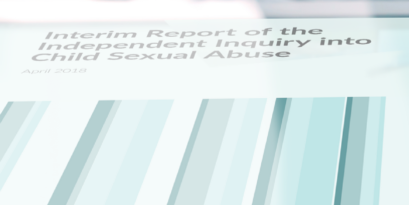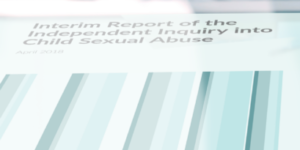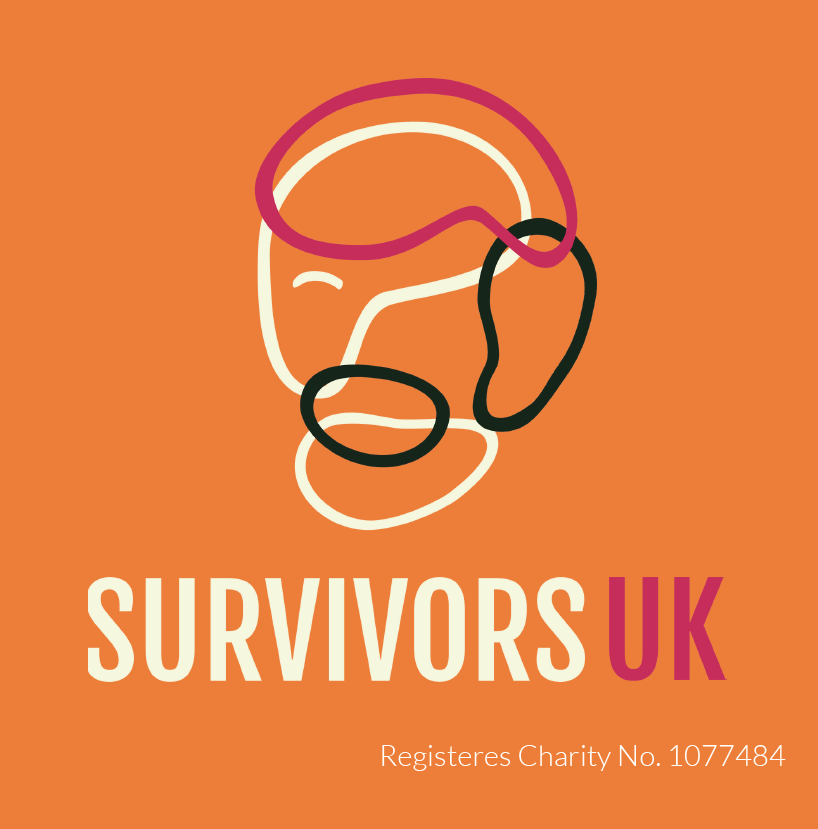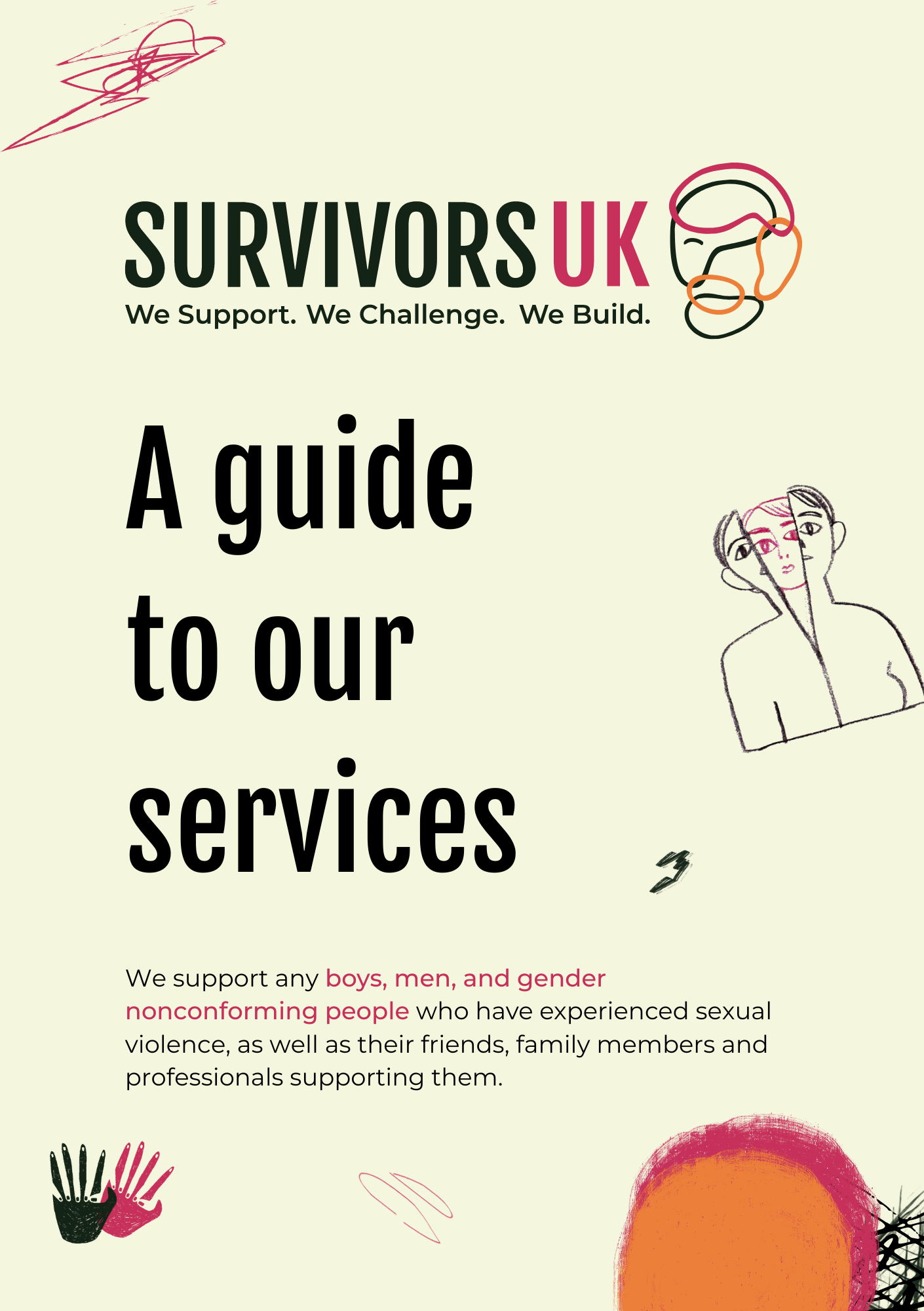
Something on account for survivors

The Independent Inquiry into Child Sexual Abuse published its Interim Report on April 25. This is a progress report which the Inquiry was obliged to produce by its remit. The full report is 109 pages.
My first impression is that Professor Jay – the most recent in a series of chairs – is on top of things. The Inquiry is doing some work. That’s reassuring.
That said, the Inquiry has a lot to do. It is holding public hearings and seminars, and carrying out a programme of research. The research mainly involves reviewing research papers. It is also running something called the Truth Project, which I have had contact with. The Truth Project is an opportunity for ‘victims and survivors’ – as the report carefully calls them – to share their experiences.
The Truth Project has a resemblance to ‘transitional justice’, as first seen in South Africa after the end of apartheid. If it really was transitional justice, the perpetrators would be invited too. I think we’re a long way, culturally and psychologically, from that kind of dialogue.
Professor Jay believes that the Inquiry is on course to make ‘substantial progress by 2020’. The Professor seems happy with that. As she took over in December 2016, I find the idea of substantial progress by 2020 slightly depressing.
The Inquiry is a government inquiry. The report isn’t addressed to survivors. Its primary audience is the government – ministers and civil servants – and the secondary audience is journalists. It’s about proving to the government that they are getting their money’s worth, and that the Inquiry is in safe hands. It’s about public opinion, as influenced by the media. The general public come third. What interest survivors are thought to take in this report isn’t immediately clear.
The report emphasises the numbers, as it would do. When discussing the Truth Project, it proudly announces ‘1,040 accounts of child sexual abuse have been shared with the Truth Project so far, 787 private sessions have been held, 253 written accounts have been received.’ Emphasis, as they say, in the original. They give figures, with charts, on such things as the uptake of support and the degree of satisfaction with support that was expressed in surveys. Personally, I find this sort of thing somewhat less than riveting.
The core of the Inquiry’s work, in the public mind and probably in reality, is the investigations. The Inquiry has established thirteen so far. That surprised me. I didn’t think it was so many.
In five of these, public hearings have already been held. It’s the hearings that get into the press.
The investigations focus on the failings of institutions, which I thought was supposed to be the focus of the Inquiry. The Inquiry seems to have widened its scope to include child abuse in general. The first forty or so pages of the report review what is known about childhood sexual abuse in general. To many survivors, it will be depressingly familiar.
The most encouraging part of the report, to me, was the account of the child migration programme, in which children – promised a better life – were sent to various Commonwealth countries. Australia, ahead of this country in many ways, has already held an inquiry.
The Interim Report is damning about the child migration has been handled, particularly about the role of successive governments. It was only in 2010 that Gordon Brown apologised.
The Report recommends that the institutions involved should apologise. They should apologise not just in public but to child migrants individually.
The Inquiry recommends, rather strongly, that the UK government should offer financial redress to all child migrants who apply. ‘This is on the basis that they were all exposed to the risk of sexual abuse.’ It also recommends that the institutions involved – mainly in the voluntary sector – should make sure they keep their records and provide access.
That part of the report is finished. Some are unfinished.
There is an investigation going on into several cases in Rochdale. One is a hostel for young working boys called Cambridge House. Another is a residential school for boys with ‘emotional and behavioural difficulties’, as it was known then, called Knowl View. The third is the more recent – and widely publicised – child exploitation case.
Richard Farnell, the leader of Rochdale Borough Council from 1986 to 1982, denied at the hearing that he had any knowledge of abuse at Knowl View. The inquiry found that claim quite incredible and published their view. Farnell has since resigned as leader. It also reviewed the rather credible allegations about Cyril Smith. It did not, I think, uncover anything new.
The Inquiry has not concluded its investigation into abuse at the Ampleforth and Downside Catholic boarding schools. It has also not concluded its investigation into the Anglican Diocese of Chichester and the Anglican Bishop of Lewes and Gloucester, Peter Ball.
The Inquiry is working on internet abuse, criminal and civil justice, criminal compensation and the health sectorand it believes it has identified a number of themes. It groups them under four main headings: cultural, professional and political, structural and financial.
The cultural factors are ‘attitudes, behaviours and values’ in institutions. Professional and political are about leadership and practice. Structural refers to legislation and institutions. There are of course also questions about money. This section is interesting. They identified, for example, discomfort talking about childhood sexual abuse and a reluctance to do so. There are a number of recommendations in this section.
I learned something in this section which completely stunned me. I learned that the UK government has not ratified the ‘Lanzarote Convention’. This is an international legal framework designed in particular to prevent child exploitation and sexual abuse. It was agreed in 2007.
I am not just shocked that the UK government hasn’t signed. I am shocked that I don’t know about it. I am a survivor. I follow current affairs. If I haven’t heard of it, I doubt that very many people have.
Overall, I am cautiously supportive. I am supportive because Professor Jay seems to have got on top of the job. The Inquiry had a depressingly chaotic start. I am cautious, partly because I think some of the problems that brought down the previous chairs still exist. The inquiry is too wide-ranging, it has too much work and the cases it is investigating are too diverse. We might have been better off with two or three separate inquiries.
We have seen inquiries before. They all make recommendations. The recommendations are often good. Locally, they may even make a difference for a while. And then everything goes back to normal.
I hope that doesn’t happen with this one. I fear it may.
There’s a great deal in the Report that I haven’t even touched on. I hope I have given a flavour. I was emailed a copy. I am on their books. I wrote a couple of emails to the Inquiry after I had my private meeting with the Truth Project. I asked why the Inquiry wasn’t survivor led. They didn’t answer. I also asked which survivor organisations they were in touch with, and what was the legitimacy of those organisations. They told me to look on the website.
I think it is only survivors who can hold the government to account on these issues. We aren’t organised.
If you want to ask for a copy of the IICSA’s Interim Report you can do so by visiting their website or emailing them at [email protected]






